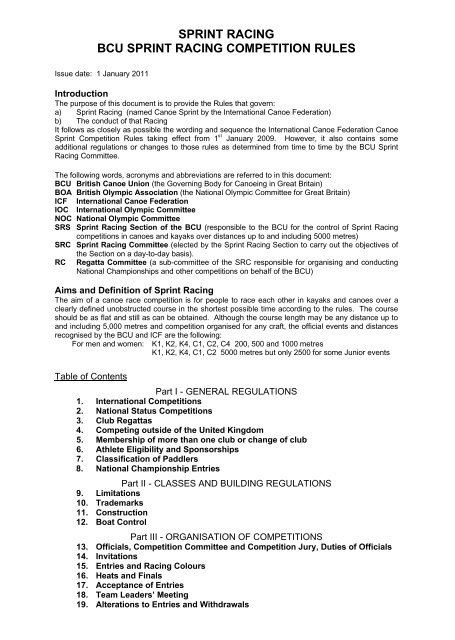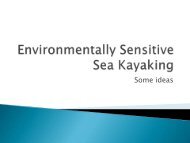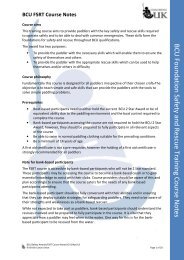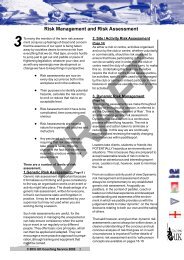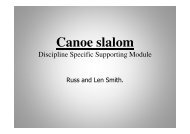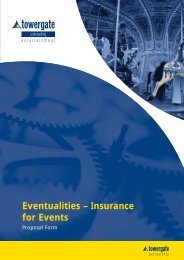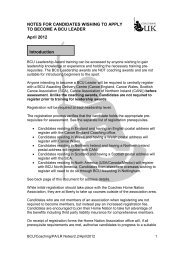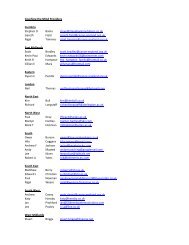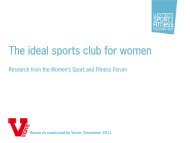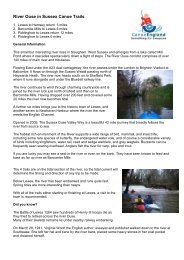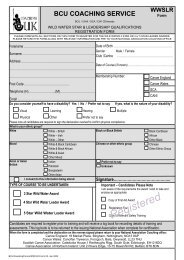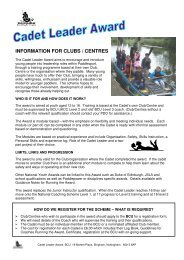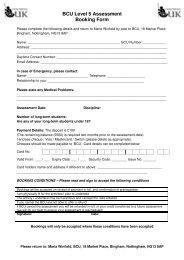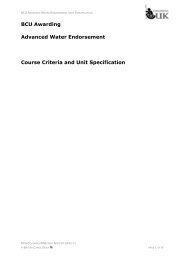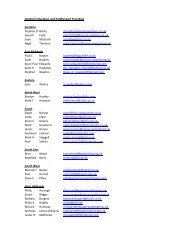BCU Sprint Racing Rules 2011 - Canoe England
BCU Sprint Racing Rules 2011 - Canoe England
BCU Sprint Racing Rules 2011 - Canoe England
Create successful ePaper yourself
Turn your PDF publications into a flip-book with our unique Google optimized e-Paper software.
SPRINT RACING<br />
<strong>BCU</strong> SPRINT RACING COMPETITION RULES<br />
Issue date: 1 January <strong>2011</strong><br />
Introduction<br />
The purpose of this document is to provide the <strong>Rules</strong> that govern:<br />
a) <strong>Sprint</strong> <strong>Racing</strong> (named <strong>Canoe</strong> <strong>Sprint</strong> by the International <strong>Canoe</strong> Federation)<br />
b) The conduct of that <strong>Racing</strong><br />
It follows as closely as possible the wording and sequence the International <strong>Canoe</strong> Federation <strong>Canoe</strong><br />
<strong>Sprint</strong> Competition <strong>Rules</strong> taking effect from 1 st<br />
January 2009. However, it also contains some<br />
additional regulations or changes to those rules as determined from time to time by the <strong>BCU</strong> <strong>Sprint</strong><br />
<strong>Racing</strong> Committee.<br />
The following words, acronyms and abbreviations are referred to in this document:<br />
<strong>BCU</strong> British <strong>Canoe</strong> Union (the Governing Body for <strong>Canoe</strong>ing in Great Britain)<br />
BOA British Olympic Association (the National Olympic Committee for Great Britain)<br />
ICF International <strong>Canoe</strong> Federation<br />
IOC International Olympic Committee<br />
NOC National Olympic Committee<br />
SRS <strong>Sprint</strong> <strong>Racing</strong> Section of the <strong>BCU</strong> (responsible to the <strong>BCU</strong> for the control of <strong>Sprint</strong> <strong>Racing</strong><br />
competitions in canoes and kayaks over distances up to and including 5000 metres)<br />
SRC <strong>Sprint</strong> <strong>Racing</strong> Committee (elected by the <strong>Sprint</strong> <strong>Racing</strong> Section to carry out the objectives of<br />
the Section on a day-to-day basis).<br />
RC Regatta Committee (a sub-committee of the SRC responsible for organising and conducting<br />
National Championships and other competitions on behalf of the <strong>BCU</strong>)<br />
Aims and Definition of <strong>Sprint</strong> <strong>Racing</strong><br />
The aim of a canoe race competition is for people to race each other in kayaks and canoes over a<br />
clearly defined unobstructed course in the shortest possible time according to the rules. The course<br />
should be as flat and still as can be obtained. Although the course length may be any distance up to<br />
and including 5,000 metres and competition organised for any craft, the official events and distances<br />
recognised by the <strong>BCU</strong> and ICF are the following:<br />
For men and women: K1, K2, K4, C1, C2, C4 200, 500 and 1000 metres<br />
K1, K2, K4, C1, C2 5000 metres but only 2500 for some Junior events<br />
Table of Contents<br />
Part I - GENERAL REGULATIONS<br />
1. International Competitions<br />
2. National Status Competitions<br />
3. Club Regattas<br />
4. Competing outside of the United Kingdom<br />
5. Membership of more than one club or change of club<br />
6. Athlete Eligibility and Sponsorships<br />
7. Classification of Paddlers<br />
8. National Championship Entries<br />
Part II - CLASSES AND BUILDING REGULATIONS<br />
9. Limitations<br />
10. Trademarks<br />
11. Construction<br />
12. Boat Control<br />
Part III - ORGANISATION OF COMPETITIONS<br />
13. Officials, Competition Committee and Competition Jury, Duties of Officials<br />
14. Invitations<br />
15. Entries and <strong>Racing</strong> Colours<br />
16. Heats and Finals<br />
17. Acceptance of Entries<br />
18. Team Leaders’ Meeting<br />
19. Alterations to Entries and Withdrawals
SPRINT RACING<br />
<strong>BCU</strong> SPRINT RACING COMPETITION RULES<br />
20. Alterations in the sequence of events<br />
21. Courses - Marking Signs - Layout<br />
22. <strong>Canoe</strong> and personal numbers<br />
23. Instructions for Competitors<br />
Part IV - RACING REGULATIONS<br />
24. Means of Propulsion<br />
25. Start<br />
26. Paddling on the Course<br />
27. Pacing<br />
28. Long Distance Competitions<br />
29. Finish<br />
30. Tasks of Competitors after the Race<br />
31. Disqualifications<br />
32. Protests<br />
33. Appeals<br />
Part V - SPECIAL RULES FOR NATIONAL CHAMPIONSHIP EVENTS<br />
Part I - GENERAL REGULATIONS<br />
There are three levels of competition: - International, National Status and Club.<br />
1. International Competitions<br />
1.1 The ICF has ruled that all International Competitions must take place in accordance with the<br />
ICF <strong>Canoe</strong> <strong>Sprint</strong> Competition <strong>Rules</strong>. All competitions organised by either the <strong>BCU</strong> or a <strong>BCU</strong><br />
Club are considered international if competitors of a foreign country are invited to participate.<br />
1.2 These competitions must be supervised or managed by at least one accredited official in<br />
possession of a valid ICF <strong>Canoe</strong> <strong>Sprint</strong> Official card.<br />
1.3 Foreign Nationals<br />
1.3.1 No member of a foreign Federation or club may compete or be invited to compete in an open or<br />
national competition within the United Kingdom without permission from the SRC.<br />
1.3.2 Only the members of clubs or associations affiliated with an ICF Member Federation have the<br />
right to participate in an international competition.<br />
1.3.3 A competitor is always allowed to take part individually in an international competition but must<br />
in each case obtain special permission from his/her national federation.<br />
1.3.4 A competitor may take part on behalf of the <strong>BCU</strong> provided they are domiciled in the UK, if<br />
he/she obtains the authorisation of his/her Federation of origin. This authorisation has to be<br />
sent before 30 th November prior to the year concerned to the ICF Headquarters with a copy to<br />
the Chairman of the ICF <strong>Canoe</strong> <strong>Sprint</strong> Committee.<br />
1.3.5 If he/she has lived for 2 (two) years or more in the UK, the approval of his/her Federation of<br />
origin is no longer required.<br />
1.3.6 A competitor may not compete for more than one Federation in any calendar year in the sport<br />
of canoeing. This rule does not apply in the case of a competitor who leaves his/her country of<br />
origin to marry and live in another country. He/she can, in this case compete for his/her new<br />
Federation without awaiting the delay of 2 years.<br />
2. National Status Competitions<br />
2.1 All competitions announced as National Status competitions shall be held in accordance with<br />
the <strong>Sprint</strong> <strong>Racing</strong> Competition <strong>Rules</strong> of the <strong>BCU</strong>.<br />
2.2 National Status Competitions are those at which promotions within the National Divisions take<br />
place.<br />
2.3 National Status Competitions are organised on behalf of the <strong>BCU</strong>.<br />
2.4 All competitors at National Status Competitions must be registered with the RC and must be<br />
<strong>BCU</strong> members or, if racing in a Junior “D” class or Mini <strong>Sprint</strong> a member of a club which has a<br />
registered youth section and is affiliated to the <strong>BCU</strong>.<br />
2.5 Organisers of National Status Competitions shall declare that the competition is being held<br />
under <strong>BCU</strong> rules.<br />
2.6 National Status Competitions require a permit from the SRC. Application for a Regatta permit
SPRINT RACING<br />
<strong>BCU</strong> SPRINT RACING COMPETITION RULES<br />
shall be directed to the Secretary of the SRC. Such a permit shall require:<br />
a) Observance of the <strong>BCU</strong> <strong>Sprint</strong> <strong>Racing</strong> Competition <strong>Rules</strong>.<br />
b) Inclusion the words "Under <strong>BCU</strong> <strong>Rules</strong>" on all printed matter issued in connection with the<br />
competition.<br />
c) Compliance with Part III Rule 13.5 regarding Regatta Officials.<br />
2.7 National Status Competitions will be included in the official <strong>BCU</strong> Calendar of events.<br />
2.8 Within 14 days of the close of a competition a completed regatta programme with results and<br />
signed by the Competition Secretary shall be sent to the Secretary of the SRC.<br />
3. Club Regattas<br />
3.1 <strong>BCU</strong> members are allowed to participate with non <strong>BCU</strong> members.<br />
3.2 No promotions will be made at Club Regattas. Performance will not affect National Ranking.<br />
3.3 The <strong>Rules</strong> and Classes may be altered to suit Club requirements.<br />
3.4 Organisers of Club Regattas may advertise their events in the <strong>Racing</strong> Hand Book on payment<br />
of the appropriate fee.<br />
3.5 Organisers are asked to encourage all who take part to become <strong>BCU</strong> members. Where fees<br />
are charged, <strong>BCU</strong> members should be charged a reduced fee.<br />
3.6 To ensure uniformity, organisers are asked to follow the <strong>BCU</strong> <strong>Sprint</strong> <strong>Racing</strong> Competition <strong>Rules</strong><br />
as far as possible.<br />
3.7 Organisers are asked to make it clear in all literature what the events and rules will be.<br />
3.8 A booklet 'Organising a Club Regatta' will be available.<br />
4. Competing outside of the United Kingdom<br />
No Club or member of a Club or individual member of the <strong>BCU</strong> may compete outside the<br />
United Kingdom without permission from the SRC. See <strong>Rules</strong> 1.3.2 to 1.3.6, which are also the<br />
rules of the ICF and apply to all Member Federations.<br />
5. Membership of more than one club or change of club<br />
When a competitor is a member of two or more clubs he shall, by March 1st have declared the<br />
name of the club in whose colours he will race that year in individual events. A person joining a<br />
second club after March 1st must continue to race for his first club. A competitor who has<br />
changed his club is not permitted to race for his new club, unless prior consent of his old club<br />
has been obtained. The consent shall not be withheld in the case of a change of residence from<br />
one area to another.<br />
6. Athlete Eligibility and Sponsorships<br />
The rules of the International <strong>Canoe</strong> Federation or the National Olympic Committee shall apply<br />
to all matters relating to Amateur Status. At present there are no regulations specific to<br />
Amateur Status other than as broadly listed in 6.2.<br />
6.1 Foreign Teams<br />
Foreign Teams may receive compensation/assistance authorised by the <strong>BCU</strong> to cover financial<br />
expense to participate in an UK competition. Under no circumstances shall any payment<br />
exceed the sum of actual expenditure.<br />
6.2 A <strong>Canoe</strong>ist/Competitor may not:<br />
a) In the practice of sport and in the opinion of the <strong>BCU</strong> manifestly contravene the spirit of fair play<br />
in the exercise of sport, particularly by the use of doping or violence.<br />
b) Have allowed his person, name, picture or sport performance to be used for advertising, except<br />
when the <strong>BCU</strong> or its Committees enter into a contract for sponsorship or equipment. All<br />
payments must be made to the <strong>BCU</strong> and not to the individual. (See also 6.6.2)<br />
c) Participate in any competition on condition of a financial consideration.<br />
6.3 A <strong>Canoe</strong>ist/Competitor may:<br />
Accept, during a period of preparation and/or actual competition which shall be limited by the<br />
rules of the <strong>BCU</strong> and its Committees:<br />
a) Assistance administered through the BOA or the <strong>BCU</strong> World Class Performance Programme:<br />
living expenses, insurance cover in respect of accidents, illness and disability; personal<br />
property, sports equipment and clothing; cost of medical treatment, physiotherapy and<br />
authorised coaches.<br />
b) Compensation authorised by his or her NOC or the <strong>BCU</strong> World Class Performance<br />
Programme, in the case of necessity, to cover financial loss resulting from his or her absence<br />
from work or basic occupation in the Olympic Games and sports competition or other canoeing
SPRINT RACING<br />
<strong>BCU</strong> SPRINT RACING COMPETITION RULES<br />
activities. In no circumstances shall payment made under this provision exceed the sum which<br />
the competitor would have earned in the same period. The compensation may be paid with the<br />
approval of the <strong>BCU</strong> or the BOA at their discretion.<br />
c) Accept prizes won in competition or other canoeing activities, within the rules established by<br />
the <strong>BCU</strong> and its Committees and the ICF.<br />
6.4 In all cases which are not covered by the above regulations (6.2 and 6.3), the corresponding<br />
rules of the ICF or the BOA shall apply.<br />
6.5 Procedures To Be Undertaken By Those Seeking, Obtaining, and Disbursing<br />
Sponsorships, Sports Scholarships and Awards.<br />
6.5.1 Details of all personal sponsorship arrangements, sports sponsorships and other awards,<br />
offered to or negotiated by individuals or organisations, must be submitted by beneficiaries to<br />
the <strong>BCU</strong> Committee responsible for administering the particular activity, for registration and<br />
approval. When doubt exists regarding the appropriate Committee to whom information should<br />
be furnished, <strong>BCU</strong> Headquarters will arrange for the necessary action to be undertaken.<br />
6.5.2 A central registry of all personal sponsorship arrangements will be maintained by the <strong>BCU</strong><br />
Headquarters, and will be available for inspection by authorised officers of the <strong>BCU</strong>.<br />
6.5.3 The term "personal sponsorship arrangements negotiated by beneficiaries" shall include:<br />
Payments made to athletes selected through the UK Sport Performance Matrix and<br />
administrated by the <strong>BCU</strong> Performance Director. Sponsorship provided by individuals (not<br />
family), commercial, industrial, and public authorities, National and Regional Sports Aid<br />
Foundations, Local Authorities, Trust Funds, Educational Institutions and agencies, Clubs and<br />
other miscellaneous supportive groups.<br />
6.6 Advertising on Boats and Equipment<br />
6.6.1 Advertising of any tobacco, tobacco related products or strong spirit drinks on boats or<br />
equipment is not permitted by the <strong>BCU</strong>.<br />
6.6.2 The IOC and the Olympic Charter regulate use of athlete images during the period of the<br />
Olympic Games. Except as permitted by the IOC Executive Board, no competitor who<br />
participates in the Olympic Games may allow his person, name, picture or sports performance<br />
to be used for advertising during the Olympic Games except where:<br />
a) The NOC of the athlete has given its express prior written consent to each such use, and<br />
b) That, in any event, such use is not in relation to the athlete’s performance at such Games.<br />
7. Classification of Paddlers<br />
7.1 Junior: A Junior is a competitor under 18 years of age at the beginning of the current calendar<br />
year. A Junior will have junior racing status unless promoted to senior racing status. Each<br />
Junior status competitor will be nominated to compete in one of the Junior classes as laid down<br />
from time to time by the SRC. Juniors who have Senior status may race in the appropriate<br />
Junior class for National Championship events.<br />
7.2 Senior: A Senior is a competitor who is over 18 years of age at the beginning of the calendar<br />
year, and will have Senior racing status. Each Senior status competitor will be nominated to<br />
compete in one of the Senior Classes as laid down from time to time by the SRC.<br />
7.3 Master (Veteran): The first year a Master can compete is the year that his or her thirty-fifth<br />
(35 th ) birthday falls in provided that he or she is not already nominated to compete in Men’s A or<br />
Women’s A<br />
7.4 Promotions: Entry to and promotion between classes will be at the discretion of the SRC and<br />
will be based on results gained in competition at regatta venues nominated by the SRC. A<br />
competitor may, at the discretion of the SRC, be permitted to revert to a lower class at the end<br />
of a regatta season.<br />
7.5 Mixed Events: Mixed events where male and female competitors take part in the same boat<br />
are permitted.<br />
7.6 Status: Status in Kayaks has no bearing on status in Canadian <strong>Canoe</strong>s and the converse i.e.<br />
a premier Senior Class competitor in Canadian <strong>Canoe</strong>s may be a lower Senior Class in Kayak.<br />
7.7 Special <strong>Rules</strong> for Kayak and Canadian Fours: Senior status competitors may not<br />
compete in fours events of a lower senior class than that for which they are nominated as<br />
individuals. Senior Class competitors may be members of fours crews competing in higher<br />
senior classes than their own without losing their individual Senior Class status. a win in a fours<br />
event does not affect the status of the members of the crew.<br />
8. National Championship Entries:<br />
Entries for these events shall be restricted to British Nationals who are members of the <strong>BCU</strong>.
SPRINT RACING<br />
<strong>BCU</strong> SPRINT RACING COMPETITION RULES<br />
Aliens resident in Great Britain for at least two years may be permitted to enter for a National<br />
Championship event. There is no time restriction in the case of men/women competitors who<br />
conform to the conditions contained in Rule 1.3.6.<br />
9. Limitations<br />
Part II - CLASSES AND BUILDING REGULATIONS<br />
K1 K2 K4 C1 C2 C4<br />
520 650 1100 520 650 900 max.length<br />
12 18 30 16 20 30 min.weight<br />
Measurements in cm - Weights in kg<br />
10. Trademarks<br />
Boats, accessories and clothing may carry trademarks, advertising symbols and written text.<br />
All advertising material should be placed in such a way that it does not interfere with<br />
competitors’ identification and does not affect the outcome of the race.<br />
The advertising of tobacco smoking and strong spirit drinks will not be accepted.<br />
N.B. These rules do not apply to the Olympic Games where there are specific limitations. See<br />
7.5 of the ICF <strong>Canoe</strong> <strong>Sprint</strong> Competition <strong>Rules</strong>.<br />
Any boat, accessory, or article of clothing, which does not comply with the above conditions,<br />
will be ineligible for use during a competition. Teams and competitors are responsible for their<br />
own equipment.<br />
11. Construction<br />
The boat must be constructed so that it remains buoyant when filled with water.<br />
11.1 The Hull<br />
Section and longitudinal lines of the hull of the kayak and canoe shall not be concave (only<br />
horizontal and vertical).<br />
11.2 The Deck<br />
The deck construction may not be higher on any horizontal point than the highest point of the<br />
front edge of the first cockpit.<br />
11.3 No foreign substance may be added to boats which give competitors an unfair advantage.<br />
11.3.1No part if the boat (including the seat and the footrest) may have moving parts which can be<br />
used to help propel the boat in a way which would give competitors an unfair advantage<br />
(existing moving seat systems already in use are accepted).<br />
11.4 It is forbidden for the boat or the competitor to be equipped with any device which would give<br />
the competitor any advantage in any way during competition.<br />
Kayaks<br />
11.5 Boats may have one rudder. Over-stern rudders may not be thicker than 10mm for K1 and K2,<br />
or 12mm for a K4.<br />
The boat to be designed as to be a sit-in (Kayak type) not a sit-on (Surf Ski type).<br />
<strong>Canoe</strong>s<br />
11.6 The canoe must be built symmetrically upon the axis of its length.<br />
Steering rudders or any guiding apparatus directing the course of the canoe is banned. A keel,<br />
if any, must be straight, shall extend over the whole length of the canoe and not project more<br />
than 30mm below the hull.<br />
The C1 and C2 may be entirely open. The minimum length of the opening shall be 280cm and<br />
the edge of the side of the craft (gunwale) can extend maximum 5cm into the craft along the<br />
whole defined opening. The boat can have maximum three strengthening bars with a width of<br />
7cm each.<br />
The C4 canoe may be entirely open. The minimum length of the opening shall be 390cm and<br />
the edge of the side of the craft (gunwale) can extend maximum 6cm into the craft along the<br />
defined opening. The boat can have maximum four strengthening bars with a width of<br />
maximum 7cm each.<br />
11.7 The competitors are responsible to ensure the boats conform to the technical requirements for
SPRINT RACING<br />
<strong>BCU</strong> SPRINT RACING COMPETITION RULES<br />
the competitions.<br />
Innovations<br />
11.8 Significant innovations in equipment including, but not limited to, boats, related equipment and<br />
clothing, must meet the requirements and conditions contained in 8.7 of the ICF <strong>Canoe</strong> <strong>Sprint</strong><br />
<strong>Racing</strong> <strong>Rules</strong>.<br />
12. Boat Control<br />
12.1 The length of a kayak or a canoe shall be measured between the extremes of the stem and the<br />
stern. Stem-bands or other projections of the stem or stern, if any, are to be included. Any<br />
rudder forming a continuation of the length of a kayak is not to be included in the measurement.<br />
12.2 No alterations in canoes and kayaks are permitted after the measuring and weighing and<br />
before the competition has taken place.<br />
Before Weighing the Boat:<br />
12.3 All loose outfit shall be removed. Permanent knee rests attached in a definitive way to the<br />
floorboard and buoyancy attachments consisting of water absorbing material must be<br />
absolutely dry at the first weighing prior to the race. Three or more boats according to the<br />
decision of the Competition Committee and on a random system shall be recontrolled<br />
immediately after the race.<br />
13. Officials<br />
Part III - ORGANISATION OF COMPETITIONS<br />
13.1 Duties of the Organising Committee<br />
An Organising Committee is responsible for the preparation and running of the competition.<br />
The Organising Committee shall, in particular:<br />
1. Fix the date and the programme of the regatta in agreement with the SRC.<br />
2. Draw up and distribute the advance programme including the date and time of the team<br />
leaders’ meeting.<br />
3. Make available a stretch of water and technical equipment conforming to the present<br />
Competition <strong>Racing</strong> <strong>Rules</strong>.<br />
13.2 Competition Committee<br />
The competition is to be managed by a Competition Committee consisting of:<br />
1) Chief Official<br />
2) Chief Judge<br />
3) Deputy Chief Judge<br />
For status competitions two members of the competition committee must be registered Regatta<br />
Officials of the <strong>BCU</strong> <strong>Sprint</strong> <strong>Racing</strong> Committee.<br />
For an international regatta two members of the Competition Committee must be in possession<br />
of a valid International <strong>Canoe</strong> <strong>Sprint</strong> Official card.<br />
13.3 The Competition Committee must:<br />
a) Organise and supervise the competition.<br />
b) In the event of inclement weather or other unforeseen circumstances which make it impossible<br />
to carry out the competition, postpone the competition and decide on another time when it may<br />
be held.<br />
c) Hear any protests that may be made and settle any disputes that may arise.<br />
d) Decide matters concerning disqualification in cases where the regulations are broken during a<br />
race.<br />
e) Should a competitor be injured during a heat, the Committee may allow him to participate in<br />
another heat.<br />
f) The decision of the Committee shall be based on the <strong>BCU</strong> <strong>Sprint</strong> <strong>Racing</strong> Competition <strong>Rules</strong>.<br />
g) Penalties in accordance with the <strong>BCU</strong> <strong>Rules</strong> or the SRC Disciplinary Regulations may also be<br />
imposed i.e. disqualification for a longer period than the duration of the competition in question.<br />
h) Before any decision is made regarding any infraction of the rules, hear the opinion of the<br />
Umpire who controlled the race in which the infraction was said to have occurred. The<br />
Committee is to seek the opinion of other officials supervising the race, if it is felt to be of<br />
importance in clearing up the alleged offence.<br />
13.4 If its nature and extent demand, each competition shall be held under the supervision of the<br />
following officials:<br />
Chief Official<br />
Aligner(s)
SPRINT RACING<br />
<strong>BCU</strong> SPRINT RACING COMPETITION RULES<br />
Chief Judge<br />
Deputy Chief Judge<br />
Competition Manager<br />
Boat Controllers<br />
Announcer<br />
Starter(s)<br />
Course Umpire(s)<br />
Turning Point Umpire(s)<br />
Finish Line Judge(s)<br />
Media Officer<br />
If circumstances permit, one person may function in two of the above positions.<br />
13.5 The Chief Official, Chief Judge, Competition Manager, Starter, Umpires, should, if possible, be<br />
registered <strong>BCU</strong> Officials.<br />
13.6 Unauthorised persons must not enter any official’s area unless the Competition Committee or<br />
the Jury send for officials or team officials in order to solve problems.<br />
13.7 The Competition Jury:<br />
a) Final authority for National Championship Competitions shall rest with a Jury composed of a<br />
Chairman and four members.<br />
b) The members of the Jury shall be appointed by a quorum of the SRC prior to the<br />
commencement of the competition. (In the event of a quorum not being present, the Chairman,<br />
Vice Chairman, or another official of the SRC and two Committee members may appoint the<br />
Jury).<br />
c) The Chairman of the Jury will be the Chairman or Vice-Chairman of the SRC or an elected<br />
SRC member.<br />
d) Subordinate to this Jury are the Chief Official and other officials shown in Rule 13.2.<br />
e) A protest made during the competition must be handed to the Competition Committee not later<br />
than 20 minutes after publication of the results.<br />
f) An appeal against a decision of the Competition Committee must be addressed to the<br />
Chairman of the Jury and handed in not later than 20 minutes after the Team Leader has been<br />
informed, in writing by the Chairman of the Competition Committee, of the decision against the<br />
competitor or crew and has signed the receipt.<br />
g) The decision of the Jury is final.<br />
13.8 Duties of Officials<br />
13.8.1 The Chief Official, who is also the Chairman of the Competition Committee, decides all<br />
matters arising during the actual contest, which is not dealt with in these rules. With the<br />
confirmation of the Competition Committee, he may disqualify any competitor who behaves<br />
improperly or who, by his conduct or speech, shows contempt towards the competition<br />
officials, other competitors or onlookers (see Rule 31.7). All officials are responsible to the<br />
Chief Official.<br />
13.8.2 The Chief Judge cooperates with the Chief Official and he/she substitutes for the Chief<br />
Official in case of necessity.<br />
13.8.3 The Deputy Chief Judge will closely cooperate with the Chief Official and the<br />
Competition Manager and will handle the administrative tasks of the competition.<br />
He will collect the notes from the Team Leaders of the participating teams/clubs on the<br />
changes before the beginning of the Team Leaders’ meeting and put them in order<br />
according to the races. At the meeting, he/she will record all changes announced by the<br />
Chief Official in his own programme.<br />
If necessary, he/she will check the personal identification documents of the competitors and<br />
their age.<br />
He will collect the forms necessary for the administration and any other means necessary<br />
for the secretariat.<br />
In case of computer data processing, he/she will keep in contact with the responsible IT<br />
person.<br />
During the competition he/she will check the results race by race and will prepare the list of<br />
the boats qualified in the next round.<br />
He will formulate the decisions of the Competition Committee passed on the subject-matter<br />
of any protest and will arrange to have it recorded in the minutes. He/she is responsible for<br />
the accuracy of the minutes. To perform the written tasks the Deputy Chief Judge can<br />
employ a Competition Secretary, assistants and office staff as necessary.<br />
13.8.4 The Competition Manager will keep in constant contact with the organisers to solve any<br />
problems that may arise during the competition. He/she supervises the races and is<br />
responsible for ensuring that the programme is followed without unnecessary delay. He/she<br />
shall inform the officials concerned punctually before a new race starts. He/she has to deal<br />
also with the good function of the competition administration of the races, (programme,<br />
drawings, results, technical documents, boat control, press, protests, etc.) He/she shall
SPRINT RACING<br />
<strong>BCU</strong> SPRINT RACING COMPETITION RULES<br />
make certain that the announcer gives all the necessary information about the races such as<br />
the start order, the name of any competitor failing to start and the results.<br />
13.8.5 The Boat Controller/s will only allow athletes to compete at the race, whose identification<br />
has been checked and whose boat, equipment, clothing, starting number and body number<br />
conform to the rules. They will also check for any performance enhancing foreign substance<br />
on the boat any forbidden devices mention in rule 11. The Official in charge must inform the<br />
Competition Committee in the case of missing boats. The competitors having passed the<br />
control are entered in a written report. Should any of the boats not fulfil the requirements<br />
concerning classification (rules 9 to 12), they shall be excluded from the competition. The<br />
organisers will provide for this purpose certified weighing and measuring devices. Standard<br />
checking procedures will be applied. At least three boats are to be selected at random from<br />
the participants in the races for boat control after the finish.<br />
13.8.6 The Starter decides all questions concerning the start of the races, and is solely<br />
responsible for decisions as to false starts. His/her decision is final. He/she shall see that<br />
the starting equipment is in good working order. He/she shall communicate with the<br />
Competition Committee and after having received a signal from them that all is ready,<br />
he/she shall order the competitors to their places and carry out the start according to the<br />
<strong>Racing</strong> <strong>Rules</strong>. It is the responsibility of the Starter to be satisfied that the circumstances at<br />
the start are free from any hindrance.<br />
13.8.7 The Aligner the duty of the aligner is to bring the boats to the starting line with the least<br />
possible delay.<br />
If an automatic starting system is in use the aligners will be positioned in two separate boats<br />
behind the starting line. They will have an unobstructed view inside the system’s boots<br />
(starting gates).<br />
When all boats are aligned and completely inside the boots the aligner will raise a white flag<br />
signifying to the starter that they are in position to start. When the boats are not in the boots<br />
the aligner shall raise a red flag.<br />
If there is no automatic starting system the aligners may be positioned on pontoons on the<br />
water or on shore beside the course and their duties will be to check the competitor’s attire<br />
and the competition number on the back and the number of the boats. When all boats are<br />
aligned he shall notify the starter by raising a white flag.<br />
13.8.8 The Course Umpire shall see to it that during a race the rules are complied with. If the<br />
rules are broken, the Umpire shall report immediately the infraction to the Competition<br />
Committee.<br />
a) The Competition Committee shall decide whether any of the competitors concerned shall be<br />
disqualified or not. If the Umpire has a report of an infraction of the rules he/she shall show a<br />
red flag after the race and shall make a report before the Umpire’s next race takes place. In<br />
such a case, the Competition Committee shall make known its decision immediately and<br />
before the result of the race is announced.<br />
b) If there is no infraction to report, the Umpire shall show a white flag.<br />
c) In races of 1,000 metres, the Umpire shall follow the race in a motorboat.<br />
In races of 200 metres, the Umpire(s) shall not follow the race. One or two Course Umpires<br />
positioned before the start line. One or two Course Umpires positioned behind the finish<br />
line.<br />
For the 500 metre races, either system as used for the 1000m or the 200m may be adopted<br />
for the Course Umpires to do their task. The Chief Official will decide on the most<br />
appropriate system to be used, based on his/her opinion of the course features.<br />
The Course Umpire can follow and judge the race also from the Finish Tower as instructed<br />
by the Chief Official.<br />
d) He shall be completely unhampered during the race. No one except the Umpire and the<br />
driver shall be admitted to the boat reserved for him.<br />
e) In long distance races with many competitors, more than one Umpire will be nominated.<br />
One of the Umpires shall, if possible, follow the leading group in the race, but without<br />
disturbing the other competitors.<br />
f) In case of hindrances the Course Umpire must stop the competition passing all boats in the<br />
race and waving the red flag or using a sound signal until all boats have stopped paddling.<br />
After this all boats shall return to the start. The Course Umpire shall report immediately the<br />
infraction to the Competition Committee.<br />
g) When a motorboat is not used, one or more Umpires shall be placed in such positions from<br />
which they can ensure that the rules are being complied with.<br />
13.8.9 The Turning Point Umpires, when a race is run along a course with one or more turning<br />
points, one or more Umpires and one recorder must be stationed at every turning point,<br />
where they gain the best view of the turn.
SPRINT RACING<br />
<strong>BCU</strong> SPRINT RACING COMPETITION RULES<br />
a) The Turning Point Umpire shall see that the competitors turn according to the rules. The<br />
recorder shall make a list of all who pass the turning point.<br />
b) Immediately after the race, the Turning Point Umpire shall report to the Competition<br />
Committee as to who has turned and if any infraction of the rules has taken place.<br />
13.8.10 The Finishing Line Judges decide the order in which the competitors passed the<br />
finishing line. The order of the boats arriving at the finishing line will be decided by Photo<br />
Finish if a Photo Finish System is used.<br />
The position of the competitors in the boat will be recorded with video camera at the time of<br />
arriving at the finish line. The Chief Finish Judge will decide with the recording whether the<br />
competitor was in his/her boat upon arriving or not and report it to the Competition<br />
Committee.<br />
When there is no Photo Finish System, the Finishing Line Judges decide the order in which<br />
the competitors have passed the finishing line. The Judges shall be placed in a position<br />
where all lanes at the finish line can be clearly seen.<br />
If the Judges differ regarding the placing of two or more competitors, a simple majority shall<br />
decide the dispute, in the absence of Photo Finish. In the case of equal voting, the Chief<br />
Finish Judge has the casting vote.<br />
When there is no Photo Finish, the Finishing Line Judges are responsible for recording the<br />
times. This shall be done by means of stopwatches or suitable electronic equipment.<br />
It is the responsibility of the Chief Finish Line Judge to ensure that the timing equipment is<br />
working correctly. The Chief Finish Line Judge shall divide the work amongst the<br />
timekeepers.<br />
At the end of each race, he shall compare the official times with the other finish line judges<br />
and immediately inform the Chief Official of them.<br />
Each race shall be timed by at least two watches. When the watches have not recorded the<br />
same time, the longest (worst) time shall be taken as correct. The stopwatches are to be<br />
started when the electronic or optical signal from the start is received.<br />
When a Photo Finish is used the result determined by the Finish Line Judges shall be<br />
compared with it, with the photo finish being decisive. Video films are not a substitute for<br />
photo finish.<br />
13.8.11 The Announcer shall, on the instructions of the Competition Manager, announce the start<br />
of each race, the order of the starting and the position of the competitors during the race.<br />
After the race is finished, he/she will announce the results.<br />
13.8.12 The Media Officer must supply all the necessary information to the representatives of the<br />
press, radio and television about the race and its progress. He/she is authorised therefore to<br />
ask for information from the different officials who must procure for him/her as soon as<br />
possible the copies from the official results.<br />
13.8.13 It is the Officials’ obligation to perform their tasks in conformity with the <strong>Racing</strong> <strong>Rules</strong>.<br />
Every judge will have the obligation to check whether all means and equipment necessary to<br />
perform his/her tasks are guaranteed. In the event any shortcoming is found, it must be<br />
reported to the Chief Official or Competition Manager.<br />
Unauthorised persons must not enter any Officials’ area unless the Competition Committee<br />
or the Jury send for officials or team officials in order to solve problems.<br />
14. Invitations<br />
An invitation to an Open Regatta shall contain the following information:<br />
a) Time and place of the regatta.<br />
b) Situation and plan of the course.<br />
c) Classes and distance of the races.<br />
d) Sequence and starting times of races.<br />
e) Whether the races are to be held on still or running water, up or down stream.<br />
f) Amount of entry fee.<br />
g) Address to which entries should be sent and the final date for receiving entries. This date<br />
shall not be earlier than 14 days prior to the first day of the competition.<br />
h) Conditions/terms of participation<br />
15. Entries<br />
Entries for Open Regattas can only be made in accordance with the regulations given in the<br />
invitation. An entry shall, however, always contain the following information:<br />
a) Name and address of competitor or crew.<br />
b) Name of club to which competitor or crew belongs.<br />
c) Classes and distances in which the competitor or crew propose to compete.<br />
d) Similar details of reserves if any.
SPRINT RACING<br />
<strong>BCU</strong> SPRINT RACING COMPETITION RULES<br />
e) The <strong>Racing</strong> Registration number of each competitor, member of the crew or reserves.<br />
f) All entries should be in writing (Letter, Fax, Email, Telegram, Telex, etc). Where verbal<br />
communication is used, it must also be confirmed in writing by the given deadline (midnight on<br />
the due date). In the event of conflicting information, the information with letterhead and/or<br />
signature will take precedence.<br />
g) Late entries shall not normally be accepted. The acceptance of late entries shall be at the<br />
discretion of the Competition Committee who may charge up to double the entry fee.<br />
15.1 <strong>Racing</strong> Colours<br />
When making the entries, Clubs must give the colours of the clothing worn by the competitors<br />
and these colours must not be changed during the competition. N.B. Every racing club must<br />
register their racing colours with the RC (and any changes thereto). All competitors from a<br />
club must wear the correct colours at all times.<br />
16. Heats and Finals<br />
16.1 At least three kayaks or canoes must be entered before a race can be held. If the number of<br />
entries in race up to and including 1,000 metres is so great that heats are necessary, the<br />
number of kayaks or canoes in each heat and in the final must not exceed nine (9).<br />
16.2 The division of competitors into heats shall be determined by drawing lots.<br />
16.3 Where the width of the course permits, eight or nine kayaks or canoes shall participate in the<br />
final if more than this number has been entered in the entire race, as follows:<br />
3 to 9 entries Direct final.<br />
10 to18 entries Two heats, three from each to final A, 4/7 (+ 8th best time if<br />
possible) to one semi-final and from the semi-final three first to<br />
final A<br />
19 to 27 entries 3 heats, 1 from each to final A, 2nd to 7th to the semi-finals, rest<br />
out<br />
Two semi-finals three first to final A. 4th to 7th (+ 8th best time if<br />
possible) to final B<br />
over 27 entries<br />
Required number of heats and semi-finals. By three semi-finals<br />
first three from each of the semi-finals to final A and 4th to 6th to<br />
final B<br />
By four semi-finals first 2 (+ 3rd best time if possible) to final A and<br />
3rd and 4th (- 3rd best time) + 2 best next time to final B<br />
16.3.1 A “B” final will only be held when there are more than 18 boats in that particular event and a C<br />
final when more then 36 boats in that particular event.<br />
16.4 When making the draw, the difference between the number of competitors in the heats of the<br />
race shall not exceed one. If the number of competitors in the heats varies, the earlier heats<br />
shall have the largest numbers.<br />
16.5 Any crew which has not taken part in a heat as instructed shall not be allowed to compete in<br />
the final.<br />
16.6 The composition of a crew which has qualified for semi-finals or for the final must not be<br />
changed. Heats and the final shall be run on the same stretch of water.<br />
16.7 For races of more than 1,000 metres, heats shall not be held, and all boats taking part shall<br />
start simultaneously.<br />
16.8 Should the width of water not permit a simultaneous start, starts at regular intervals shall be<br />
permitted.<br />
16.9 The procedure for selecting competitors to race in finals will be on the basis of one of two<br />
criteria: either times or positions obtained in heats. The criterion used for each event will be<br />
decided by the SRC and published in advance of the event.<br />
17. Acceptance of Entries<br />
17.1 Confirmation that the entry has been accepted, together with notification of the result of the<br />
draw and time of events, shall be sent to the entrant on written request by him and on<br />
production by the entrant to the Competition Organiser of a "stamped addressed" envelope.<br />
17.2 The Organising Committee will accept the entries in conformity with the conditions/terms of<br />
participation. Therefore the Organising Committee can reject or delete the entry of the<br />
participants who fail to observe the conditions/terms of participation.<br />
18. Team Leaders’ Meeting<br />
At least 2 hours before the first race of the competition (12 hours for an International<br />
Competition), the team leaders’ meeting is to be held. At this meeting the names of team
SPRINT RACING<br />
<strong>BCU</strong> SPRINT RACING COMPETITION RULES<br />
leaders should be advised. The organisers will describe the regatta course and all other<br />
arrangements, which should be adhered to for the duration of the competition. The Chief<br />
Official will describe the competition programme and ask for any changes to the entries.<br />
19. Alterations to Entries and Withdrawals<br />
19.1 Any competitor named in the final entry or at the Team Leaders Meeting may substitute for any<br />
other in the given type of racing (kayak men, kayak ladies, canoe men). Notification of<br />
alterations in the entries must be given in written form to the Chief Official at least one hour<br />
before the first race of the morning or afternoon session.<br />
19.2 The withdrawal from a race is considered final and no renewed entry of the same crew is<br />
allowed.<br />
19.3 Every competitor whose entry has been confirmed by his own club, at the time of the meeting<br />
of the team leaders, called for this purpose, is obliged to take part in the due event. The<br />
refunding of entry fees for entries withdrawn not less than 24 hours before the competition is at<br />
the discretion of the Competition Committee.<br />
20. Alterations in the sequence of events<br />
The sequence of races given in the programme and the intervals between races as given in the<br />
racing programme are binding on the organisers. Alterations cannot be made unless the<br />
respective Team Managers at the competition give their consent.<br />
21. Courses<br />
Marking Signs<br />
21.1 For National Championships and where possible for other competitions the turning points shall<br />
be marked by at least six flags (or buoys) which shall be readily distinguishable and shall, if<br />
possible be diagonally divided with one half in red and the other half in yellow.<br />
21.2 Both the start and the finishing lines shall be marked with red flags or buoys, at the points<br />
where these lines intersect the outer limits of the course.<br />
Layout<br />
21.3 Before the start of the races the racing course shall be measured and marked by means of<br />
clearly visible flags mounted on buoys.<br />
a) The course at the start shall permit a clear width where possible, of at least 5 metres for each<br />
boat.<br />
b) For National Championships the starting and finishing lines shall be at right angles to the<br />
course.<br />
c) The finishing line shall be at least 45 metres long and be marked by two flags. The Finishing<br />
Line Judges must be placed as near to the finishing line as possible.<br />
d) For National Championship races up to 1,000 metres, the course must be straight and in one<br />
direction.<br />
21.4 For races exceeding 1,000 metres turning points are permitted. For National Championship<br />
races exceeding 1,000 metres the following conditions should be fulfilled, if possible:<br />
a) The distance between the starting line and the first flag of the first turning point (1st leg) shall<br />
be straight and at least 1,859.25 metres.<br />
b) The distance between the last flag of the first turning point and the first flag of the second<br />
turning point (2nd leg) shall be straight and maximum 1759.25 metres.<br />
c) The distance between the last flag of the second turning point and the first flag of the third<br />
turning point (3rd leg) shall be a maximum of 500 metres.<br />
d) The specifications of all other stretches shall be in accordance with point “c”.<br />
e) The radius of each turn should, if possible be at least 40.5 metres.<br />
f) Both the start and the end of the race shall be in front of the Finishing Tower.<br />
g) The red flags of the finish line shall be placed as much to the outside possible in order to get<br />
the widest feasible finish line.<br />
h) Any starting pontoons for the 500 metre races are to be removed.<br />
21.5 For competitions, including the National Championships, these conditions should be complied<br />
with, unless a special dispensation for the course has been obtained from the SRC through the<br />
Secretary.<br />
22. <strong>Canoe</strong> Numbers<br />
All kayaks and canoes shall carry a vertical number plate made of non-transparent material<br />
marked with black numbers on white background (for Internationals) or yellow background<br />
indicating the lane. The numbers on the plate must measure 15 cm in height and 25 mm in
SPRINT RACING<br />
<strong>BCU</strong> SPRINT RACING COMPETITION RULES<br />
thickness. The plates shall be placed on the centre line of the aft deck or bar. The approximate<br />
size of the number plate shall be 18 x 20 cm.<br />
The personal numbers provided by the organisers shall be placed on the back of the competitor<br />
only.<br />
23. Instructions for Competitors<br />
Written instructions shall be available for competitors 2 hours before the start of the<br />
competition, containing the following information:<br />
a) Detailed information on the courses and their markings<br />
b) Starting time<br />
c) Starting line<br />
d) Finishing line<br />
e) Competitors racing number<br />
f) Type of boat control<br />
Part IV - RACING REGULATIONS<br />
24. Means of Propulsion<br />
24.1 Kayaks shall be propelled solely by means of double-bladed paddles.<br />
24.2 Canadian <strong>Canoe</strong>s shall be propelled solely by means of single-bladed paddles.<br />
24.3 The paddles may not be fixed on the boat in any way.<br />
24.4 If a paddle is broken a competitor may not be provided with a new one by a supporter.<br />
25. Start<br />
25.1 Lots shall be drawn to determinate in the heats the lanes of boats at the start. Number one<br />
shall be on the left, then number two and so on. When there is television coverage of an<br />
event, the lane numbering may be in the opposite direction – from right to left, so that the list<br />
of competitors and their lanes shown on the television screen match the appearance of the<br />
races to be televised.<br />
25.2 In competitions where heats are required, lots must be drawn separately for each heat.<br />
25.3 Competitors shall be on the water at the starting area, not less than five minutes prior to the<br />
specified time of their race. The starting area is defined as being the area of water within 100<br />
metres before the starting line.<br />
Two minutes before the defined starting time the competing boats have to take the lane<br />
determined in the programme.<br />
25.4 Competitors shall be at the starting area in time to allow satisfactory preparation for the start.<br />
25.5.1 The start shall be given without reference to absentees.<br />
25.5.2 If the competitor does not start, and has no valid reason approved by the Competition<br />
Committee, he shall be disqualified for the whole regatta. A competitor, who arrives too late<br />
at the start, shall be considered to have voluntarily withdrawn and shall be disqualified under<br />
this rule.<br />
25.6 When signalled by the Starter, the competitor will take the start position designated so that the<br />
bow of the boat is on the start line. In case of an automatic starting system the competitor will<br />
place himself/herself so that the bow of the boat is on the start line and thus in the start<br />
machine.<br />
25.7 Boats must be stationary.<br />
25.8 If the Starter is not satisfied with the line-up he/she will call “STOP”, and hand over to the<br />
Aligner for repositioning.<br />
25.9 After the order “START WITHIN TEN SECONDS” the starting signal is a strong sound (or<br />
shot). Between the order “START WITHIN TEN SECONDS” and the starting signal<br />
competitors must not paddle. In this period paddling ahead before the starting signal is<br />
considered a false start. The boat placed on the starting line must not move before the start.<br />
Competitors must only react to the start signal and are not permitted to anticipate it. The<br />
competitors can paddle only upon hearing the starting signal.<br />
25.10 In the event of a false start, the Starter must immediately give a powerful sound signal. On<br />
hearing this signal all competitors must stop paddling and follow the Starter’s instructions for a<br />
new start. Before the new start, the Starter must identify the offending crew/s making the<br />
false start and give them a warning. In the event of a second false start by the same crew the<br />
boat will be disqualified from the race and must leave the starting area and the course<br />
immediately.
SPRINT RACING<br />
<strong>BCU</strong> SPRINT RACING COMPETITION RULES<br />
25.11 The Starter may also recall competitors for a new start in the event of any unforeseen<br />
circumstance – a malfunction of the starting equipment for example. In such a case the same<br />
powerful sound signal must be given. If a malfunction of the starting equipment was caused<br />
through a boat making a false start, as in 25.9 the crew must be given a warning, as in 25.10,<br />
even though that boat may not have crossed the start line. If the malfunction was not the<br />
cause of any competitor making a false start, no penalty shall be imposed.<br />
25.12 The Starter will start the race when he/she is satisfied that everything meets with his/her<br />
approval. He/she will make a written report on any false start and forward it to the Chief<br />
Official.<br />
25.13 In the long distance races the starter shall declare "START WITHIN ONE MINUTE" when he<br />
is satisfied he will give the starting signal by a shot or a short powerful sound. The Starter will<br />
start the race when he/she is satisfied that everything meets with his/her approval. He/she<br />
will make a written report on any false start and forward it to the Chief Official.<br />
26. Paddling on the Course<br />
26.1 In races up to 1000 metres, competitors must keep the whole of their boat within the four-metre<br />
wide central area of their lane from the start to the finish of the course. Upon any deviation, the<br />
boat must go back immediately to this central area of the lane. No boat must come nearer than<br />
five metres in any direction to the boat of another competitor – that is, gunwale to gunwale or<br />
bow to stern.<br />
26.2 If a boat leaves the centre of the lane and does not return to it, the boat may be disqualified<br />
from the event.<br />
26.3 A boat which leaves its allocated lane must be disqualified from the event.<br />
26.4 If a race is declared null and void, no change of the composition of a crew is permitted at the<br />
new start.<br />
26.5 If there is a capsize the competitor or crew is eliminated from the race.<br />
26.6 The Umpire has the right to interrupt a correctly started race if unforeseen hindrances arise.<br />
The course Umpires with a red flag and sound signal may effect such an interruption.<br />
Competitors must immediately stop paddling and await further instructions.<br />
26.7 If a paddle is broken a competitor may not be provided with a new one by a supporter.<br />
27. Pacing<br />
27.1 Taking pace or receiving assistance from boats not in the race or by any other means is not<br />
permitted.<br />
27.2 When a race is in progress crews not taking part in the race are strictly forbidden to proceed<br />
over whole or part of the course, even outside the marking buoys.<br />
28 Long Distance Competitions<br />
28.1 Races of more than 1,000 metres, competitors may deviate from their lane providing they do<br />
not impede other competitors.<br />
28.2 When a race is run on a course with turning points these shall be passed to port (i.e. in an anticlockwise<br />
direction).<br />
28.3 A competitor will not be disqualified for touching a turning buoy, unless, in the opinion of the<br />
Turning Point Umpires, an advantage has been gained there from. In making a turn, the boat<br />
shall follow as closely as possible the course as marked by the buoys at the turning points.<br />
28.4 If there is a capsize the competitor or crew is eliminated from the race if he/she or they are not<br />
able to get in the boat without outside help.<br />
28.5 Any competitor who is responsible for a collision or who damages the canoe or kayak or paddle<br />
of another can be disqualified and can be required to pay damages.<br />
28.6 When going around a turning point, the competitor on the outer course must leave room for the<br />
competitor on the inner course if that competitor has the bow of his boat at least level with the<br />
front edge of the cockpit of the boat on the outer course. With respect to K2 and K4, this refers<br />
to the fore-cockpit. With respect to C1, it refers to the level of the competitor's body, and for C2<br />
it refers to the level of the body of the foremost member of the crew.<br />
28.7 When a canoe or kayak is overtaking another canoe or kayak in a race, it is the duty of the<br />
overtaking craft to keep clear at all times of the boat being overtaken.<br />
28.8 On the other hand, the craft being overtaken must not alter its course to make difficulties for the<br />
overtaking craft.<br />
29. Finish
SPRINT RACING<br />
<strong>BCU</strong> SPRINT RACING COMPETITION RULES<br />
29.1 The boat has finished the race when its bow crosses the finish line with all crew members in it.<br />
The Finish Line Judges will determine the result of the competition based on the order of the<br />
boats arriving according to the rules.<br />
29.2 If two or more boats reach the finishing line at the same time they are awarded the same<br />
classification in the final. In the case of a dead heat finish for any position, which determines<br />
the advance to the next level of the competition the following rules will apply:<br />
a) Wherever there are sufficient number of lanes available in the next level of the competitions,<br />
drawing of lots will determine to which race each boat will advance. If possible it may use also<br />
lane number 10.<br />
b) Wherever there are not enough lanes available there will be a re-race between the boats<br />
involved 30 minutes after the race (and for International Competitions after the last race of the<br />
day, or half day programme)<br />
c) In the case of a dead heat in the re-race, drawing of lots will determine the outcome.<br />
30. Tasks of Competitors after the Race<br />
30.1 The competitor must leave the course after the finish of the race and cannot disturb the next<br />
race.<br />
30.2 The crews selected by the Competition Committee for boat control must immediately contact<br />
the place allocated for the post race boat control.<br />
30.3 If selected for doping control, the competitor must comply with the obligations stipulated by the<br />
<strong>BCU</strong> Anti-Doping policy.<br />
30.4 Before the award ceremony the top three crews of the final must be present at the location and<br />
time indicated.<br />
30.5 At National Championships the competitors must wear club, team or squad <strong>Racing</strong> Colours or<br />
Tracksuit at the award ceremony, as may be stipulated by the Organising Committee or SRC.<br />
31. Disqualifications<br />
31.1 Any competitor who attempts to win a race by any other than honourable means, who breaks<br />
the <strong>Racing</strong> Regulations, or who disregards the honourable nature of the <strong>Racing</strong> Regulations,<br />
shall be disqualified for the duration of the race concerned.<br />
31.2 Should a competitor have completed a race in a kayak or canoe which is shown upon<br />
inspection not to conform with the classifications (see <strong>Rules</strong> 9-12), he/she shall be disqualified<br />
from the race in question.<br />
31.3 It is prohibited to receive external assistance during a race.<br />
31.4 No crew may be accompanied along and adjacent to the racecourse by other boats while the<br />
race is in progress.<br />
31.5 No crew may receive assistance by using objects thrown into the course.<br />
Any of the above infractions will result in the disqualification of the competitor(s) concerned.<br />
31.6 All disqualifications by the Competition Committee have to be confirmed in writing immediately<br />
with the reasons. The Team Leader has to acknowledge the receipt on a copy with the exact<br />
time, which is the start of the protest time.<br />
Failure to deliver the copy confirmation of the disqualification to the team leader does not<br />
invalidate the disqualification.<br />
31.7 The Competition Committee may discipline any competitor or Official whose behaviour is<br />
detrimental to the good order and conduct of the competition. The Competition Committee may<br />
after repeated action by the offender disqualify him/her for that competition.<br />
32 Protests<br />
32.1 A protest against a crew to compete in a race shall be advised to a member of the Competition<br />
Committee not later than one hour before the start of the race. A protest made later - within 30<br />
days from the date when the race in question was held is only permitted if the officials of the<br />
club of the competitor making the protest can prove that the facts on which the protest is based<br />
came to their knowledge later than one hour before the start of the race.<br />
32.2 A late protest shall be referred to the SRC accompanied by the prescribed fee (see below).<br />
A protest made during the competition must be handed to the Competition Committee not later<br />
than 20 minutes after publication of the results.<br />
32.3 A protest made during a competition must be addressed to the Competition Committee not later<br />
than 20 minutes after the Team Leader has been informed on the decision against his/her<br />
competitor or team and has signed the receipt.<br />
32.4 All protests must be made in writing and be accompanied by a fee of £5.00 (International<br />
Competitions £15.00 or 25 Euros). The fee will be refunded if the protest is upheld. If the
SPRINT RACING<br />
<strong>BCU</strong> SPRINT RACING COMPETITION RULES<br />
protest is not upheld the fee may not be refunded, at the discretion of the Competition<br />
Committee or SRC hearing the protest.<br />
32.5 When a protest or a report is made against an athlete or a team, the team leader of the<br />
athlete/team in question shall be presented with the protest or report to read.<br />
33 Appeals<br />
Competitors have the right to appeal to the SRC through their club or team management<br />
against a decision of the Competition Committee, within 30 days from the date when the race<br />
was held. In the case of National Championship Competitions the appeal must be made to the<br />
Competition Jury in accordance with Rule 13.7. A fee of £15.00 shall accompany the appeal.<br />
The fee will be refunded if the appeal is upheld. The <strong>BCU</strong> SRC (or Jury in the case of a<br />
National Championship) shall pronounce the final decision.<br />
Part V - SPECIAL RULES FOR NATIONAL CHAMPIONSHIP EVENTS<br />
34. Only members of the <strong>BCU</strong> who qualify under Rule 8 may participate in National Championship<br />
events. The only exceptions to this rule are those exempted under Rule 1.3.<br />
35. All canoes and kayaks must comply with the classes and building rules as laid down in Part II of<br />
these rules.<br />
36. Officials: Fully in accordance with <strong>Rules</strong> 13.1 to 13.4.<br />
37. Competition Committee: Fully in accordance with Rule 13.2 and 13.3.<br />
38. Competition Jury: Fully in accordance with <strong>Rules</strong> 13.7, 32 and 33.<br />
39. Marking signs: In accordance with Rule 21.<br />
40. Courses: In accordance with Rule 21.<br />
41. Disqualifications: In accordance with Rule 31.<br />
42. Medals and Trophies:<br />
Irrespective of the number of competitors in a National Championship event, Trophies and<br />
Gold, Silver & Bronze medals will be awarded as appropriate.<br />
Notes to the <strong>BCU</strong> <strong>Sprint</strong> <strong>Racing</strong> Competition <strong>Rules</strong><br />
Races Exceeding 1,000 Metres at the National Water Sports Centre Nottingham, <strong>Rules</strong><br />
21.4 and 21.5<br />
Because of limitations at the National Water Sports Centre - mainly the start pontoon being fixed for<br />
the Start of two 5000 metre and one 2500 metre events - it is not possible to comply with the Rule and<br />
provide the three courses required. The 2nd leg under the Rule is 47.75 metres too long. The<br />
requirements given in the Rule are those of the ICF, which the <strong>BCU</strong> must shadow in its own <strong>Rules</strong>.<br />
Long Distance Courses at the National Water Sports Centre, approved by the SRC<br />
To provide flexibility there are four turning points with the start and finish of the turns as follows:<br />
1. 10 metres beyond the finish line<br />
2. 450 metres from the finish line<br />
3. 1123 metres from the finish line<br />
4. 1796 metres from the finish line.<br />
International <strong>Rules</strong> Course - 1 long lap + 1 short lap<br />
(Avoiding pontoons at 500 metres which would need to be parked as far back as possible)<br />
a) Between the start line and first flag of the first turning point = 1902.25 metres<br />
b) Between the last flag of first turn and first flag of second turn = 1806.00<br />
c) Between last flag of second turn and first flag of third turn = 460.00<br />
d) Between last flag of third turn and the finish = 450.00<br />
e) Three turns of 127.25 metres each = _381.75<br />
5000.00
SPRINT RACING<br />
<strong>BCU</strong> SPRINT RACING COMPETITION RULES<br />
Domestic Course - 2 medium laps<br />
a) Between the start line and first flag of the first turning point = 1229.25 metres<br />
b) Between the last flag of first turn and first flag of second turn = 1133.00<br />
c) Between last flag of second turn and first flag of third turn = 1133.00<br />
d) Between last flag of third turn and the finish = 1123.00<br />
e) Three turns of 127.25 metres each = 381.75<br />
5000.00 metres<br />
Short Course for Juniors - 1 lap of Domestic Course - 2500 metres<br />
a) Between the start line and first flag of the turning point = 1229.25 metres<br />
b) Between the last flag of the turn and the finish = 1123.00<br />
c) One turn of = _127.25<br />
2479.50 metres<br />
NB With a fixed start position and by using the same turning buoys for the 5000 metre course an<br />
exact 2500 metre course cannot be obtained. It is 20.5 metres short.<br />
.<br />
BRITISH CANOE UNION - SPRINT RACING SECTION<br />
DISCIPLINARY REGULATIONS<br />
These Disciplinary Regulations adopted by the <strong>Sprint</strong> <strong>Racing</strong> Committee on the 7 th June 2008 are<br />
intended for all complaints other than “Field of Play” incidents, but including any event referred on by<br />
a Protest Committee dealing with a field of play incident.<br />
These Regulations set out how matters referred to the <strong>Sprint</strong> <strong>Racing</strong> Committee by the Union’s<br />
Investigations Officer or a Protest Committee are dealt with.<br />
1. Interpretation<br />
1.1 In these regulations the words and expressions used shall have the following meanings:<br />
“the Board”<br />
“the Investigations Officer”<br />
“the Protest Committee”<br />
“the Executive Committee”<br />
“Member”<br />
“the Union”<br />
the board of the Union as constituted under the<br />
Memorandum and Articles of Association of the Union;<br />
the Investigations Officer of the Union appointed by the<br />
Chief Executive from time to time;<br />
the persons appointed from time to time by the <strong>Sprint</strong><br />
<strong>Racing</strong> Committee or an event organiser to deal with<br />
matters arising during competition;<br />
the persons elected or appointed at an ACM to the <strong>Sprint</strong><br />
<strong>Racing</strong> Committee from time to time;<br />
an individual member of the Union participating in the<br />
Discipline in respect of whom a complaint has been made<br />
under Regulation 2.1 of these procedures;<br />
the British <strong>Canoe</strong> Union;<br />
1.2 All references to periods of a number of days, relate to the period starting the day after the<br />
date of posting or the date of receipt where documents are delivered by hand or the date of<br />
the incident or meeting and ending the day of receipt, meeting etc.<br />
1.3 Words denoting the singular number shall include plural number and vice versa and words<br />
denoting the masculine gender shall include the feminine gender.<br />
2. Disciplinary Procedure<br />
2.1 The Executive Committee shall appoint a panel of three of its members (“the Panel”) to hear<br />
and determine any complaint or matters referred to it by a Protest Committee or the Union’s<br />
Investigations Officer under Regulation 6.2(a)(ii) of Part A of the Union’s Dispute Resolution
SPRINT RACING<br />
<strong>BCU</strong> SPRINT RACING COMPETITION RULES<br />
and Disciplinary Procedures for matters other than Doping and Child Protection Matters. The<br />
Executive Committee and the Panel shall deal with such matters in accordance with the<br />
procedure set out below.<br />
2.2 The Panel shall ensure that as soon as practicable and within 14 days of receiving the<br />
complaint from either the Investigations Officer or a Protest Committee, a copy of the<br />
complaint has been handed personally or by recorded delivery post to the Member.<br />
Notification of the date when the Panel will meet (via e-mail, personal or conference call<br />
communications, if deemed appropriate) to consider the complaint will be set as soon as<br />
practicable and within 30 days and an invitation to provide in writing, within 14 days (or such<br />
shorter time period as the Panel thinks fit) of the notice, any rebutting facts, mitigation,<br />
explanation or submission must be sent to the Member with the copy of the complaint. No<br />
member of the Panel may consider the matter in the event that he has a conflict of interest or<br />
could not be regarded as being impartial in the matter. In such circumstances, the Panel<br />
shall, in its sole discretion, replace that member with another member of the Executive<br />
Committee and if no such member can hear the matter then that member shall be replaced<br />
with another elected member of the Union for the only purpose of considering the complaint.<br />
2.3 At the same time the Member shall be asked whether he wishes to be present at the meeting<br />
when the complaint is being considered, in which case that Member shall be informed that<br />
they may attend to make representations and that he may be asked questions. The Member<br />
shall also be informed that if no reply is received within the period of 14 days (or such shorter<br />
time period as the Panel thinks fit) the Panel will consider the complaint in his absence on the<br />
basis of the facts and statements in their possession. The Panel may invite the person<br />
making the complaint to comment on any reply provided by the Member, and shall supply a<br />
copy of any such comments to the Member before the meeting. The Panel may in its sole<br />
discretion invite the person making the complaint to attend the meeting.<br />
2.4 At the meeting the Panel shall consider the complaint and any statement made in writing or<br />
orally by the Member. If that Member has asked to be present at the meeting he must have<br />
been given not less than seven days (or such shorter time period as the Panel thinks fit)<br />
notice of the meeting and he must have been invited to attend the meeting and offered the<br />
opportunity of being accompanied by an advisor. The Panel may question either party, if<br />
present, may call upon them to supply additional evidence or may adjourn the meeting to a<br />
later date. Once the Panel has completed its consideration of the complaint, it shall provide<br />
the Member with its written decision as soon as practicable and in any event within 14 days of<br />
the date of the original meeting or any adjourned meeting.<br />
2.5 On completing its considerations of the complaint, the Panel shall draw up its findings of fact<br />
and may decide:<br />
(a)<br />
(b)<br />
(c)<br />
(d)<br />
to reject the complaint; or,<br />
to warn or reprimand the Member; or,<br />
to suspend the Member from participating in specified events or training facilities held<br />
under the <strong>Sprint</strong> <strong>Racing</strong> Committees jurisdiction either:<br />
(i) for a specified period, not exceeding three months; or,<br />
(ii) for a specified number of such events or facilities, not exceeding five in<br />
number, consecutively, where that number, would not have taken place<br />
within the three-month period specified above; or,<br />
to recommend to the Board that the Member should be suspended from participating<br />
in <strong>Sprint</strong> <strong>Racing</strong> events or training facilities for a longer period or that the Member<br />
should be suspended or expelled from the Union, or that some other specified penalty<br />
(such as suspension of funding) should be imposed by the Board.<br />
2.6 Where the Panel has found against the member, it shall as soon as practicable and in any<br />
event within the 14 days of the date of its original meeting or any adjourned meeting notify<br />
that Member by recorded delivery post of its findings of fact and of its decision and the<br />
grounds for that decision or recommendation, and shall inform him of his right of appeal under<br />
Regulations 2.8 and 2.9 below, and shall send a copy of the notification to the Board.<br />
2.7 Where the Panel has made recommendations to the Board under 2.5(d) above, the Board<br />
shall decide whether or not to adopt such recommendations a Board Meeting shall be
SPRINT RACING<br />
<strong>BCU</strong> SPRINT RACING COMPETITION RULES<br />
convened (via e-mail, personal or conference call communications) as soon as practicable to<br />
decide on the sanction to be imposed.<br />
2.8 If the Member or the person who made the original complaint disagrees with the decision of<br />
the Panel, he shall be entitled to make a new complaint pursuant to Rule 3.1 (b) of Part A of<br />
the Union’s Dispute Resolution and Disciplinary Procedures for matters other than Doping<br />
and Child Protection Matters by way of a Notice. The Notice must set out in detail why the<br />
Member or the person who made the original complaint disagrees with the decision of the<br />
Panel. The Notice must be accompanied by a cheque for Ñ100 made payable to the Union<br />
(“the Deposit”). This Deposit shall be held by the Union and re-paid to the Member or the<br />
person who made the original complaint in the event that his complaint against the Decision is<br />
upheld by an Arbitral Panel or Disciplinary Committee. Where the Member’s or the person<br />
who made the original complaint is rejected by an Arbitral Panel or Disciplinary Committee or<br />
if the matter is resolved by mediation, the Deposit shall be retained by the Union.<br />
2.9 The Investigations Officer shall consider the matter and decide if the Notice shows that there<br />
is on the face of it sufficient evidence for the case to be determined in accordance with Rule<br />
6.1 of Part A of the Union’s Dispute Resolution and Disciplinary Procedures for matters other<br />
than Doping and Child Protection Matters. If he does so decide, he shall refer the Dispute to<br />
be decided by the Disciplinary Committee or to resolve by arbitration or by mediation in<br />
accordance with Rule 6.2 of Part A of the Union’s Dispute Resolution and Disciplinary<br />
Procedures for matters other than Doping and Child Protection Matters. A different person<br />
shall be appointed as the Investigation Officer to make this decision to the person who was<br />
appointed as the Investigations Officer to review the initial Complaint against the Member.<br />
Clause 8.2 of the Terms of Reference of the <strong>Sprint</strong> <strong>Racing</strong> Committee<br />
The Executive Committee shall have the power to appoint a panel of three persons to decide any<br />
matter referred to it pursuant to Rule 6.2(a)(ii) of the Union’s Dispute Resolution and Disciplinary<br />
Procedures for matters other than Doping and Child Protection Matters in accordance with the<br />
Disciplinary Regulations approved by the Board and adopted by the <strong>Sprint</strong> <strong>Racing</strong> Committee from<br />
time to time.<br />
In addition to the Section’s Disciplinary Regulations the <strong>BCU</strong> <strong>Sprint</strong> <strong>Racing</strong><br />
Committee adopted regulations on 1 January 2001 as follows:<br />
3. Code of Ethics<br />
Everyone within the <strong>BCU</strong> <strong>Sprint</strong> <strong>Racing</strong> Section is subject to the conditions and ethics as given<br />
in Section 5 of the <strong>BCU</strong> ‘Coaching Code’ published by the <strong>BCU</strong> UK Coaching Service, and are<br />
required to operate under the same general Sport and Recreation Code of Ethics.<br />
4. Regatta Officials<br />
4.1 It is vital for the honourable nature of the Sport that Officials are not subjected to any act that<br />
may compromise their position.<br />
4.2 Regatta Officials must not be threatened or subjected to harassment, intimidation or abuse. No<br />
attempt should be made to persuade Regatta Officials to take an action which is dishonest or<br />
contrary to the Official’s code of ethics or honourable nature of the <strong>Sprint</strong> <strong>Racing</strong> Regulations.<br />
This applies at anytime, in or out of competition. It is incumbent on each Official to report all<br />
such acts.<br />
4.3 The report should be in writing and sent without delay to the <strong>Sprint</strong> <strong>Racing</strong> Committee (through<br />
the Section Secretary) who will consider the matter in accordance with the Section’s<br />
Disciplinary Regulations.<br />
4.4 In the event of an action taken immediately prior to or during a <strong>BCU</strong> Regatta, the Official should<br />
hand their written report to the Chief Official. The Chief Official with the Regatta Committee<br />
must take action in accordance with the Section’s Disciplinary Regulations.


